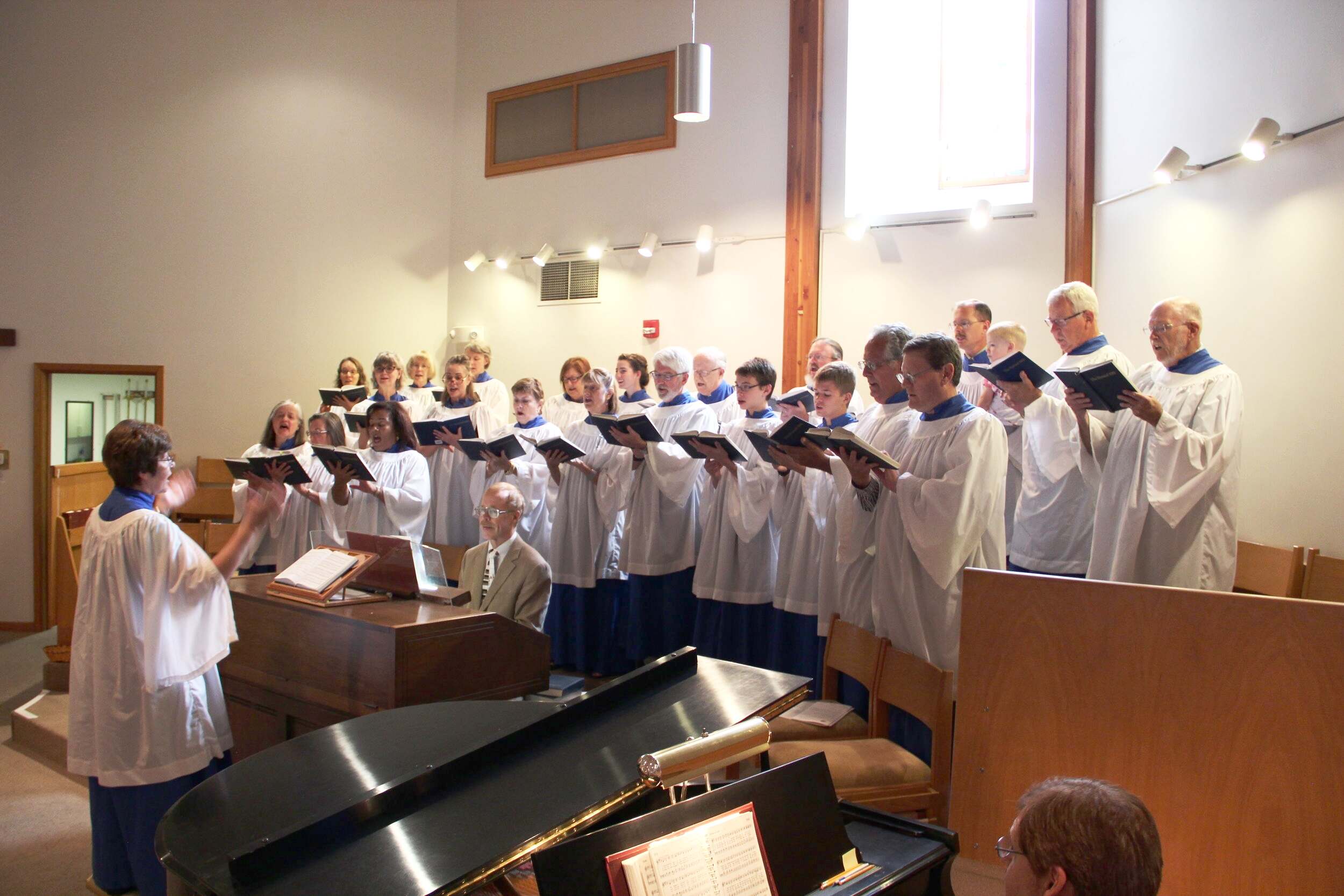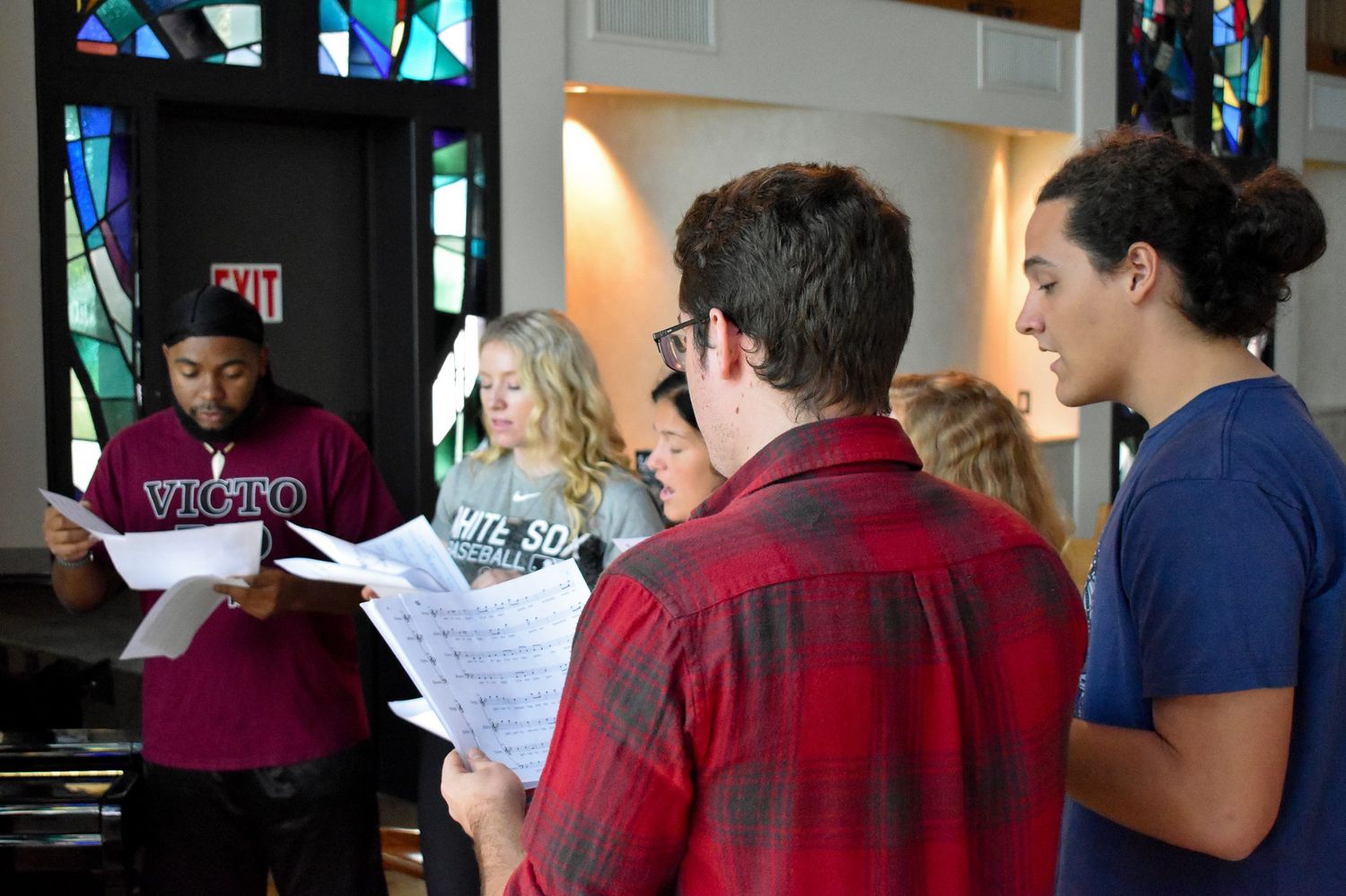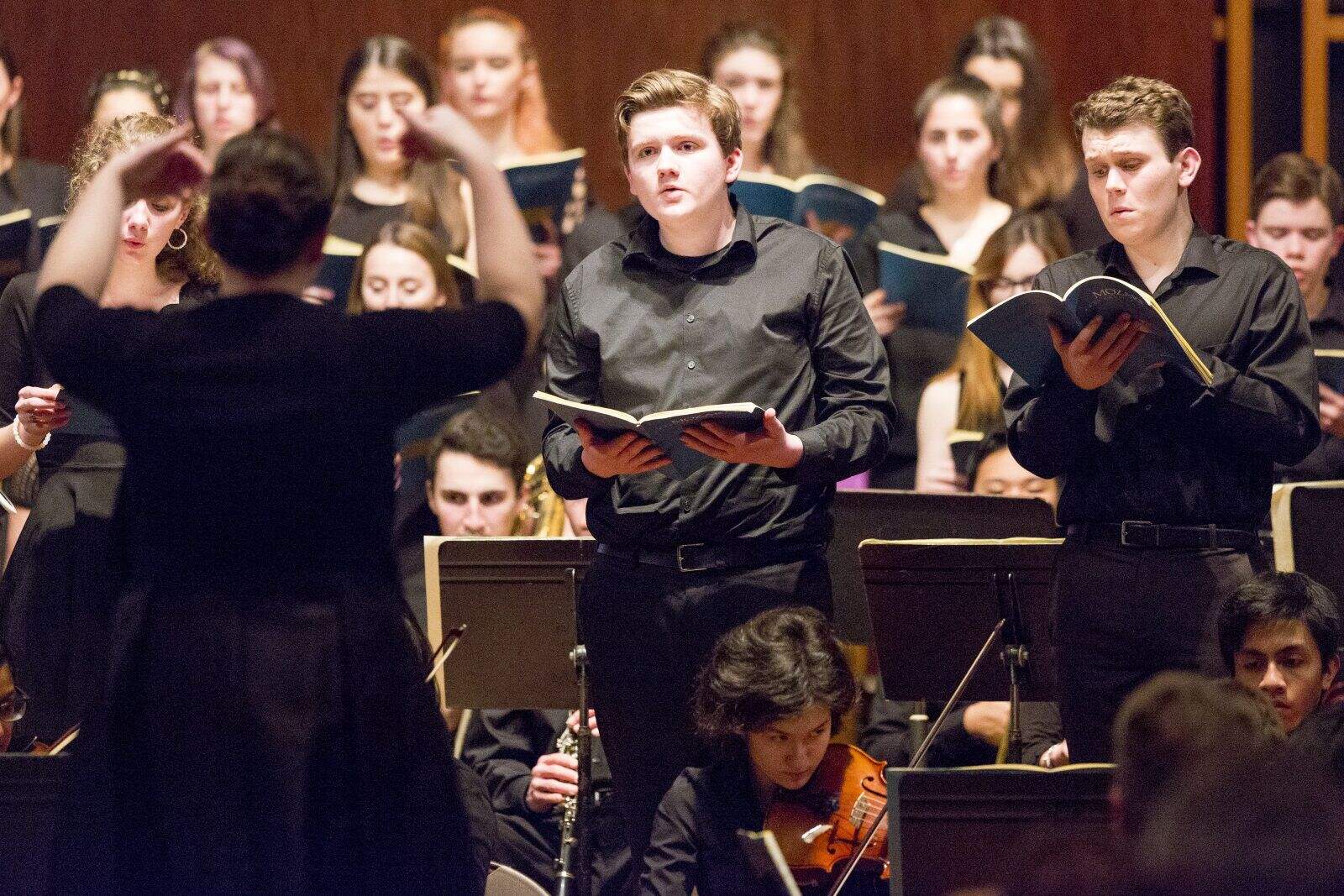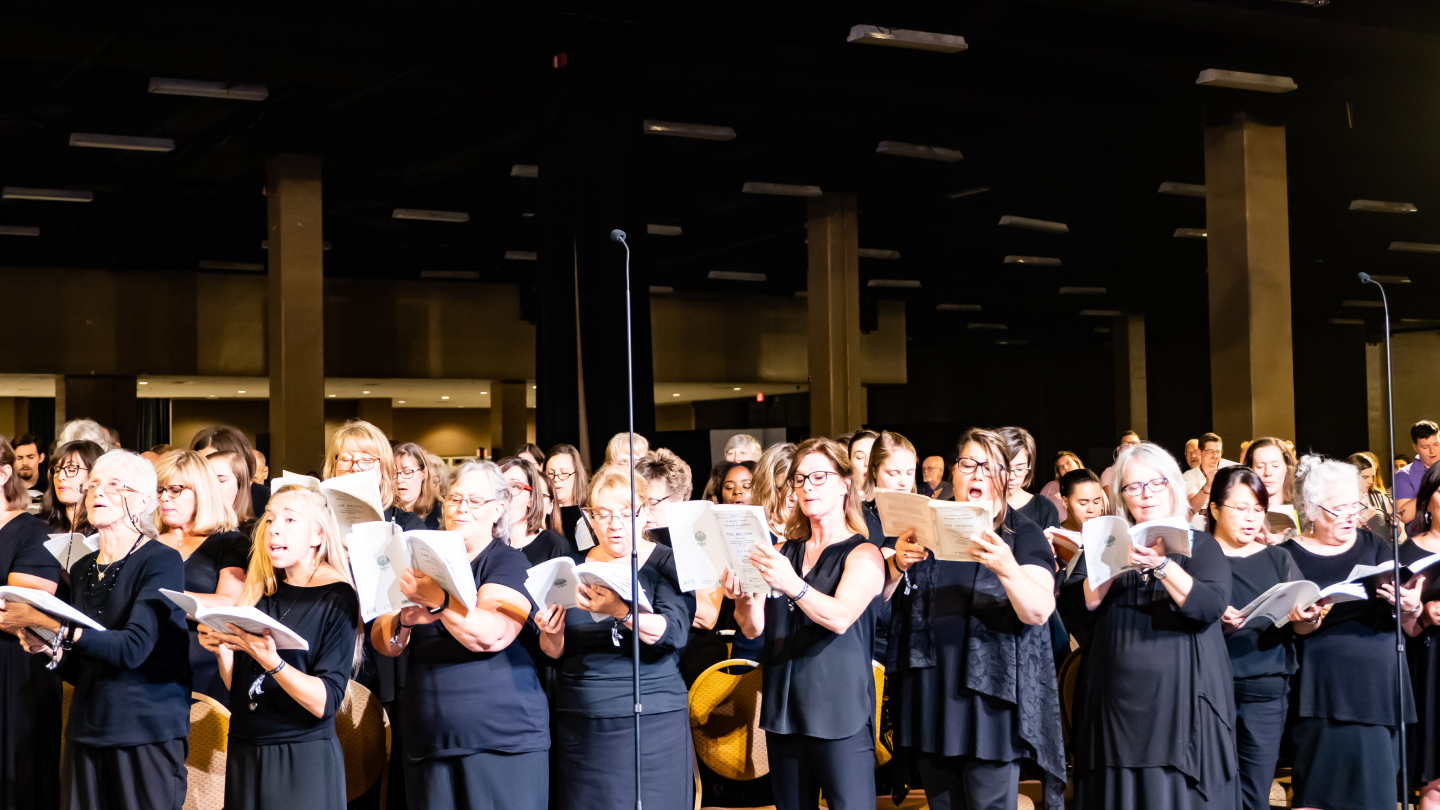Home>Production & Technology>Choir>How To Build A Strong Church Choir


Choir
How To Build A Strong Church Choir
Published: February 23, 2024
Learn how to build and lead a strong church choir with our expert tips and resources. Enhance your choir's performance and impact.
(Many of the links in this article redirect to a specific reviewed product. Your purchase of these products through affiliate links helps to generate commission for AudioLover.com, at no extra cost. Learn more)
Table of Contents
Introduction
Building a strong church choir is a remarkable endeavor that not only enriches the worship experience but also fosters a sense of community and belonging among its members. A vibrant choir has the power to uplift spirits, inspire congregants, and create a harmonious atmosphere that resonates throughout the sanctuary. However, achieving such a level of excellence and cohesion within a choir requires deliberate planning, dedicated effort, and a clear vision.
In this comprehensive guide, we will explore the essential steps to building a strong church choir that is not only musically proficient but also spiritually connected. Each step is designed to provide valuable insights and practical strategies for choir leaders, directors, and members who are committed to nurturing a choir that embodies unity, passion, and purpose.
As we embark on this journey, it's important to recognize that a strong church choir is more than just a group of individuals singing in harmony. It is a collective expression of faith, devotion, and artistry that resonates deeply with both the choir members and the congregation. By following the steps outlined in this guide, choir leaders and members can cultivate an environment where musical talents are honed, spiritual growth is nurtured, and a profound sense of community is established.
Throughout this guide, we will delve into the intricacies of selecting the right members, establishing a clear vision, providing ongoing training and support, fostering a spirit of unity and camaraderie, encouraging regular practice and commitment, and nurturing musical and spiritual growth. Each step plays a pivotal role in shaping a church choir that not only performs beautifully but also embodies the values and virtues that are integral to the church community.
As we unravel the components of building a strong church choir, it's important to approach this journey with an open heart, a willingness to learn, and a deep appreciation for the transformative power of music within a spiritual context. With each step, we will uncover valuable insights and practical strategies that can be implemented to elevate the choir's performance, deepen its spiritual resonance, and foster a sense of belonging that extends beyond the notes and melodies.
Join us as we embark on this enriching exploration of building a strong church choir, where music, faith, and fellowship converge to create a harmonious tapestry of worship and unity.
Step 1: Selecting the Right Members
Selecting the right members is the foundational step in building a strong church choir. It is essential to identify individuals who not only possess musical talent but also embody the values and spirit of the choir. When choosing members, consider their commitment to the choir's vision, their willingness to collaborate, and their dedication to spiritual growth through music.
Here are key considerations for selecting the right members:
-
Musical Proficiency: Look for individuals who demonstrate a strong musical aptitude, including pitch accuracy, vocal range, and the ability to blend harmoniously with others. While technical skills can be developed, a fundamental level of musical ability is crucial for the choir's overall sound.
-
Spiritual Alignment: Seek members who resonate with the spiritual essence of the choir's mission. Their passion for worship and their ability to convey emotion through music can profoundly enrich the choir's performances and resonate with the congregation.
-
Commitment and Reliability: Choose individuals who are committed to regular attendance, punctuality, and active participation in rehearsals and performances. Reliability and dedication are essential for maintaining the choir's cohesion and ensuring consistent musical excellence.
-
Collaborative Spirit: Look for team players who are willing to collaborate with fellow choir members, support one another, and contribute to a harmonious ensemble. A spirit of unity and cooperation among members fosters a cohesive and uplifting musical experience.
-
Diversity and Inclusivity: Embrace diversity within the choir by welcoming members from varied backgrounds, age groups, and vocal abilities. Inclusivity enriches the choir's dynamic and fosters a sense of unity that transcends differences.
-
Leadership Potential: Identify individuals with leadership potential who can support the choir director, mentor new members, and contribute to the overall growth and development of the choir.
By carefully selecting members who embody these qualities, a church choir can lay a strong foundation for musical excellence, spiritual resonance, and a sense of community that uplifts both the choir and the congregation. Each member's unique talents and qualities contribute to the collective tapestry of the choir, creating a harmonious and enriching musical experience that resonates deeply with all who are touched by its uplifting melodies.
Step 2: Establishing a Clear Vision
Establishing a clear vision is paramount in building a strong church choir. A well-defined vision serves as the guiding light that shapes the choir's purpose, goals, and collective identity. It provides a framework for the choir's musical repertoire, performance style, and overall impact within the church community. When the vision is clearly articulated and embraced by all members, it unifies their efforts and ignites a shared sense of purpose and passion for the choir's mission.
To establish a clear vision, choir leaders and directors should engage in thoughtful reflection and collaborative dialogue with choir members. This process involves defining the choir's core values, musical objectives, and its role in enhancing the worship experience. By involving the entire choir in this visioning process, each member becomes personally invested in the collective aspirations, fostering a deep sense of ownership and commitment.
A clear vision also encompasses the following elements:
-
Musical Direction: Define the musical direction that aligns with the church's worship philosophy and the choir's unique identity. This may involve selecting a diverse repertoire that reflects the church's traditions, while also embracing innovative musical expressions that resonate with contemporary congregations.
-
Spiritual Impact: Articulate how the choir's performances and musical selections are intended to inspire, uplift, and spiritually enrich the congregation. Emphasize the transformative power of music in fostering a deeper connection to faith and communal worship.
-
Community Engagement: Outline how the choir aims to engage with the broader church community, including participation in special events, outreach programs, and collaborative initiatives that extend the choir's impact beyond regular worship services.
-
Excellence and Growth: Communicate a commitment to musical excellence, continuous improvement, and the nurturing of individual talents within the choir. Encourage a culture of learning, mentorship, and artistic growth among choir members.
-
Unity and Fellowship: Emphasize the importance of fostering a supportive and inclusive environment where members feel valued, respected, and interconnected. Highlight the role of the choir in cultivating a sense of fellowship and unity within the church community.
By establishing a clear vision that encompasses these elements, a church choir sets a compelling course for its collective journey. This vision serves as a source of inspiration, motivation, and alignment, guiding the choir's endeavors and shaping its impact within the church and beyond. It becomes the heart and soul of the choir, infusing every rehearsal, performance, and interaction with a sense of purpose and unity that resonates deeply with all who are touched by its uplifting melodies.
Step 3: Providing Ongoing Training and Support
Providing ongoing training and support is a cornerstone of building a strong church choir. It is essential to nurture the musical and spiritual growth of choir members through continuous learning, mentorship, and pastoral care. By investing in the development of its members, the choir cultivates a culture of excellence, fosters a sense of belonging, and elevates its collective artistry to new heights.
Tailored Vocal Training
Tailoring vocal training to the specific needs of choir members is crucial for honing their individual and collective vocal abilities. This may involve organizing vocal workshops, hiring vocal coaches, or providing resources for self-study. By addressing technical aspects such as breath control, vocal range, and choral dynamics, choir members can refine their vocal skills and contribute to a more polished and cohesive choir sound.
Musical Education and Appreciation
Offering musical education and appreciation sessions enriches the choir's understanding of music theory, historical context, and diverse musical genres. This broader musical knowledge enhances the choir's interpretative abilities, fosters a deeper appreciation for the repertoire, and empowers members to convey the emotional and spiritual essence of the music more effectively.
Spiritual and Emotional Support
Providing spiritual and emotional support is equally vital in nurturing the well-being of choir members. This may involve pastoral counseling, creating a safe space for open dialogue, and fostering a supportive environment where members can find solace, encouragement, and spiritual nourishment. A strong support system enhances the choir's cohesiveness and empowers members to express their faith through music authentically.
Mentorship and Leadership Development
Establishing mentorship programs and leadership development initiatives empowers experienced choir members to guide and inspire newer members. This transfer of knowledge and experience fosters a culture of mentorship, where seasoned singers offer guidance, encouragement, and constructive feedback to nurture the growth of their peers. Additionally, identifying and nurturing emerging leaders within the choir ensures continuity and sustained excellence in the choir's musical and spiritual journey.
Rehearsal Dynamics and Feedback
Creating an environment of constructive feedback and collaborative learning during rehearsals is essential for the choir's continuous improvement. Encouraging open communication, active participation, and mutual respect among members fosters a culture of collective growth. By providing regular feedback and guidance, choir leaders and directors can steer the choir towards refinement and unity, resulting in performances that resonate deeply with the congregation.
By prioritizing ongoing training and support, a church choir invests in the holistic development of its members, shaping them into skilled musicians, empathetic communicators, and spiritually attuned worship leaders. This commitment to nurturing the talents and well-being of its members forms the bedrock of a resilient and inspired choir, poised to elevate the worship experience and enrich the spiritual tapestry of the church community.
Step 4: Fostering a Spirit of Unity and Camaraderie
Fostering a spirit of unity and camaraderie within a church choir is essential for creating a cohesive and uplifting musical ensemble. When choir members share a deep sense of connection, mutual respect, and a collective commitment to their shared mission, the resulting harmony extends far beyond the notes they sing. It permeates the very essence of their performances, resonating with the congregation and fostering a profound sense of community within the church.
Unity within a choir begins with cultivating an environment of inclusivity and respect. Embracing diversity in vocal abilities, backgrounds, and life experiences enriches the choir's dynamic and fosters a sense of unity that transcends differences. Each member's unique contribution is valued and celebrated, creating a tapestry of voices that reflects the richness and diversity of the church community.
Camaraderie is nurtured through shared experiences, collaborative endeavors, and a genuine spirit of support among choir members. Engaging in team-building activities, social gatherings, and outreach initiatives fosters a sense of belonging and strengthens the bonds among members. When individuals feel connected on a personal level, their musical collaboration becomes infused with warmth, empathy, and a shared sense of purpose.
Communication plays a pivotal role in fostering unity and camaraderie within the choir. Open dialogue, active listening, and mutual respect form the foundation of effective communication. By creating a culture of transparency and inclusiveness, choir leaders and members can address challenges, celebrate achievements, and collectively navigate the journey of musical and spiritual growth.
Furthermore, establishing rituals and traditions that honor the choir's collective identity and celebrate individual milestones fosters a sense of continuity and belonging. Whether through annual retreats, special performances, or shared rituals of reflection and gratitude, these traditions strengthen the choir's sense of community and create lasting memories that bind its members together.
Ultimately, fostering a spirit of unity and camaraderie within a church choir is a continuous and intentional endeavor. It requires nurturing an environment where every member feels valued, supported, and empowered to contribute to the collective harmony. When unity and camaraderie permeate the fabric of the choir, its music becomes a testament to the transformative power of shared purpose, mutual respect, and the unifying spirit of faith.
Step 5: Encouraging Regular Practice and Commitment
Encouraging regular practice and commitment is fundamental in nurturing a strong church choir. The dedication and discipline of its members significantly influence the choir's musical proficiency, cohesiveness, and ability to deliver impactful performances that resonate with the congregation. By fostering a culture of regular practice and unwavering commitment, choir leaders and directors lay the groundwork for excellence and spiritual resonance within the choir.
Regular practice sessions serve as the crucible where individual talents coalesce into a harmonious ensemble. Choir members hone their vocal techniques, refine their musical interpretations, and internalize the nuances of each piece through consistent rehearsal. It is within these dedicated practice sessions that the choir's collective artistry is shaped, polished, and elevated to a standard that uplifts the worship experience.
To encourage regular practice, choir leaders can establish a structured rehearsal schedule that accommodates the availability of members while ensuring consistent engagement. By prioritizing and respecting the time and effort invested by each member, the choir cultivates a culture of mutual commitment and shared responsibility towards its musical journey.
Furthermore, instilling a sense of accountability and ownership among choir members reinforces the importance of regular practice. By fostering a collective understanding of the impact of individual preparation on the choir's overall performance, members are motivated to dedicate themselves to personal practice outside of rehearsals, thereby contributing to the choir's collective growth and proficiency.
In addition to regular practice, cultivating a deep sense of commitment among choir members is essential for sustaining the choir's vibrancy and impact. Emphasizing the significance of each member's role in the choir's collective mission fosters a profound sense of purpose and responsibility. This shared commitment transcends individual aspirations, uniting members in their dedication to uplifting the worship experience through music.
Recognizing and celebrating the efforts and achievements of committed choir members further reinforces the value of dedication within the choir. Whether through acknowledgment during performances, appreciation events, or personalized encouragement, choir leaders can affirm the significance of commitment and inspire members to continue their unwavering dedication to the choir's collective journey.
By encouraging regular practice and nurturing a culture of commitment, a church choir fortifies its foundation of musical excellence, spiritual resonance, and collective unity. Through the harmonious fusion of individual dedication and collective commitment, the choir's performances become a testament to the transformative power of steadfast practice and unwavering devotion, enriching the worship experience and uplifting the spirits of the congregation.
Step 6: Nurturing Musical and Spiritual Growth
Nurturing the musical and spiritual growth of a church choir is a multifaceted endeavor that encompasses the development of technical proficiency, artistic expression, and a deepened connection to the spiritual essence of music. This step is pivotal in shaping a choir that not only delivers captivating performances but also resonates with the congregation on a profound spiritual level.
Artistic Development
The pursuit of musical excellence requires a commitment to continuous learning and artistic refinement. Choir leaders play a crucial role in nurturing the artistic growth of their members by providing opportunities for vocal coaching, musical workshops, and exposure to diverse repertoire. Encouraging choir members to explore new vocal techniques, interpretive styles, and expressive nuances empowers them to evolve as versatile and emotive performers, capable of conveying the depth and beauty of the music they present.
Spiritual Enrichment
Beyond the technical aspects of music, nurturing the spiritual growth of choir members is essential in fostering performances that resonate deeply with the congregation. Incorporating moments of reflection, prayer, and spiritual contemplation into rehearsals and performances creates a sacred space where members can infuse their music with genuine emotion, reverence, and a profound connection to their faith. By embracing the spiritual significance of their musical journey, choir members cultivate a sense of purpose and transcendence that elevates their performances to a transcendent and deeply spiritual experience.
Mentorship and Guidance
Establishing mentorship programs and providing individualized guidance to choir members fosters a culture of support and personalized development. Seasoned choir members and directors can offer mentorship to nurture the talents of their peers, providing constructive feedback, encouragement, and sharing their wealth of experience. This mentorship not only enhances the technical and artistic abilities of individual members but also strengthens the bonds of unity and camaraderie within the choir, creating a nurturing environment where musical and spiritual growth flourish.
Collaborative Exploration
Encouraging collaborative exploration of music and faith enriches the collective understanding and interpretation of the choir's repertoire. Engaging in group discussions, musical analysis, and shared reflections on the spiritual significance of their performances deepens the choir's connection to the music and its underlying message. By embracing a collaborative approach to musical and spiritual exploration, choir members develop a profound appreciation for the transformative power of music in worship and communal expression.
By nurturing the musical and spiritual growth of its members, a church choir cultivates a collective ethos of artistic excellence, spiritual depth, and unwavering devotion. The harmonious fusion of technical prowess and spiritual resonance enables the choir to deliver performances that transcend mere musicality, uplifting the hearts and souls of the congregation and affirming the profound impact of music as a conduit for spiritual connection and communal worship.
Conclusion
In conclusion, the journey of building a strong church choir is a transformative odyssey that intertwines musical excellence, spiritual resonance, and communal unity. Each step in this comprehensive guide, from selecting the right members to nurturing musical and spiritual growth, contributes to the collective tapestry of the choir's journey. As choir leaders, members, and directors embark on this enriching endeavor, they are not only shaping a musical ensemble but also cultivating a profound expression of faith, devotion, and artistic unity.
The culmination of these steps converges in the choir's performances, where the harmonious fusion of individual talents, collective commitment, and spiritual depth resonates deeply with the congregation. The choir becomes a conduit for uplifting the spirits of the worshipers, fostering a sense of community, and creating a sacred space where music becomes a transcendent expression of faith and unity.
Furthermore, the impact of a strong church choir extends beyond the sanctuary, reaching into the hearts and lives of its members and the broader church community. Through its commitment to excellence, unity, and spiritual enrichment, the choir becomes a beacon of inspiration, nurturing a culture of inclusivity, support, and artistic growth within the church.
As the choir's voices blend in harmony, they echo the values and virtues of the church community, embodying the transformative power of music in worship and communal expression. The culmination of each step in this guide, from fostering a spirit of unity and camaraderie to encouraging regular practice and commitment, culminates in performances that transcend mere musicality, uplifting the hearts and souls of the congregation and affirming the profound impact of music as a conduit for spiritual connection and communal worship.
In essence, building a strong church choir is a testament to the enduring power of music to unite, inspire, and uplift. It is a celebration of faith, artistic expression, and the unwavering commitment of individuals who, through their collective voices, create a symphony of worship, unity, and spiritual resonance that transcends the notes and melodies. As the choir continues on its journey, it becomes a living embodiment of the church's values, enriching the worship experience and nurturing a profound sense of community, belonging, and spiritual fulfillment.











